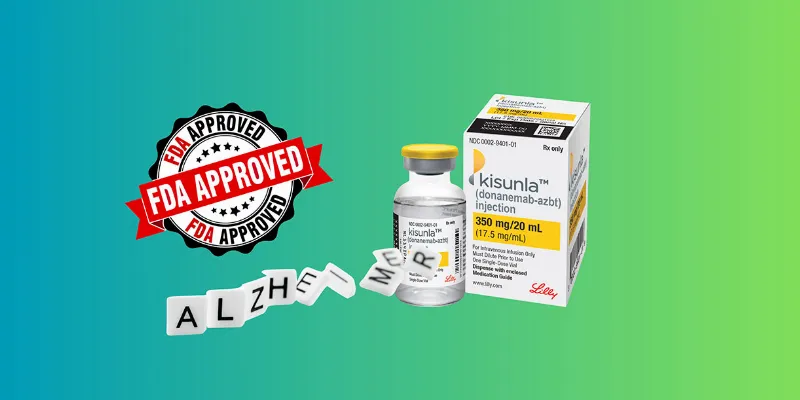FDA Approves Kisunla, a Novel Alzheimer's Therapy Targeting Amyloid Plaques

3 July 2024
The FDA has approved Kisunla for the treatment of early symptomatic Alzheimer's, demonstrating up to a 35% reduction in cognitive decline over 18 months and curtailing disease progression. This first-of-its-kind amyloid-targeting therapy significantly diminishes amyloid plaques—by 84% on average—and has the potential to change standard Alzheimer's care.
Eli Lilly announced that the U.S. Food and Drug Administration (FDA) has approved Kisunla™ (donanemab-azbt), a novel Alzheimer's treatment. Kisunla slowed cognitive and functional decline in its pivotal Phase 3 study and reduced participants' risk of progressing to the next clinical stage of the disease by up to 39%. Remarkably, nearly half of the patients completed their treatment within 12 months, showcasing its efficiency.
Kisunla, similar to another drug, Leqembi, approved last year, are both intravenous infusions that attack a protein involved in Alzheimer’s. Both drugs can slow the unfolding of dementia by several months and carry similar safety risks, including swelling and bleeding in the brain. Leqembi, made by Eisai and Biogen, is administered every two weeks; Kisunla is given monthly.
A Shift in Alzheimer's Care
"This approval is emblematic of the new era of Alzheimer's research where we now have the first class of disease-modifying drugs that will eventually be used in combination with novel therapies—based on the biology of aging—that target all the underlying complexities of this disease. This milestone will not only catalyze the next generation of therapies, but also reframe how we deliver treatments," said Dr. Howard Fillit, Co-Founder and Chief Science Officer at the Alzheimer's Drug Discovery Foundation (ADDF) in a press announcement.
Clinical Trial Insights
The effectiveness of Kisunla, was assessed in a double-blind, placebo-controlled pivotal Phase 3 study, TRAILBLAZER-ALZ 2, involving 1,736 patients exhibiting mild cognitive impairment or mild dementia and confirmed amyloid pathology. Participants were randomized to receive either 700 mg of Kisunla every 4 weeks for the first three doses, followed by 1400 mg every 4 weeks, or a placebo, over a period of up to 72 weeks. Treatment efficacy was monitored with PET scans at weeks 24, 52, and 76, allowing adjustments to placebo if amyloid levels were sufficiently reduced.
"This is real progress. This approval allows people more options and greater opportunity to have more time. Having multiple treatment options is the kind of advancement we've all been waiting for — all of us who have been touched, even blindsided, by this difficult and devastating disease," said Joanne Pike, Alzheimer's Association president and CEO in a press announcement.
Results at week 76 showed that Kisunla significantly reduced clinical decline as measured by the Integrated Alzheimer's Disease Rating Scale (iADRS), the ADAS-Cog13, and the ADCS-iADL scale, demonstrating notable improvements in cognitive functions and daily living activities compared to placebo. The study population was predominantly white (91%), with a mean age of 73 years, highlighting a demographic spread from 59 to 86 years.
"Kisunla demonstrated very meaningful results for people with early symptomatic Alzheimer's disease, who urgently need effective treatment options. We know these medicines have the greatest potential benefit when people are treated earlier in their disease, and we are working hard in partnership with others to improve detection and diagnosis," said Anne White, EVP and president of Lilly Neuroscience, Eli Lilly and Company.
Potential Side Effects and Safety Measures
While Kisunla offers substantial benefits, it is not without potential side effects. Amyloid-related imaging abnormalities (ARIA), such as temporary brain swelling or small spots of bleeding, were observed. However, these were typically non-symptomatic and resolved over time. Other possible reactions include certain allergic reactions during infusion, though these are generally manageable under medical supervision. Please see full Prescribing Information including boxed warning for ARIA and Medication Guide for Kisunla.
This advancement is also a testament to the emerging role of precision medicine in treating Alzheimer's. With new biomarkers and blood tests, early detection and intervention have become more accessible, promising a future where Alzheimer's can be detected and treated even before symptoms manifest.
With two anti-amyloid drugs now approved, the focus is shifting towards a comprehensive treatment regime that incorporates these and future therapies. The ongoing development of drugs targeting other aspects of Alzheimer's pathology is crucial, as nearly 75% of the drugs in the pipeline now target beyond the traditional markers of amyloid and tau.
Cost and Coverage
The total cost for Kisunla varies depending on the duration of treatment, which can be stopped once minimal amyloid plaque levels are achieved. The FDA-endorsed regimen allows for shorter treatment periods and monthly 30-minute infusions, potentially reducing out-of-pocket costs and the frequency of treatments compared to other therapies targeting amyloid.
About Kisunla
Kisunla™ (donanemab-azbt) is a prescription treatment targeting amyloid plaques for individuals with mild cognitive impairment or mild dementia in early symptomatic Alzheimer's, requiring confirmed amyloid pathology. Administered intravenously every four weeks—700 mg initially, followed by 1400 mg—Kisunla may cause serious side effects such as amyloid-related imaging abnormalities (ARIA) and infusion-related reactions.











Comments
No Comments Yet!